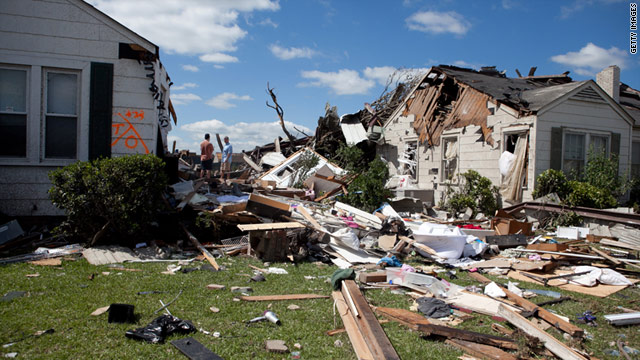 I had to live all over the country before I realized that Americans everywhere live with some kind of fear hanging over their daily lives.
I had to live all over the country before I realized that Americans everywhere live with some kind of fear hanging over their daily lives.Those who live in river towns grow up with stories of floods. West Coasters joke about earthquakes to anesthetize themselves from the omnipresent reality of the real thing. Those who live in California and the Southwest can expect drought and horrific wildfires once or twice a decade, and anyone who lives a lifetime in the Gulf area must feel like they've lived through the plagues of the Old Testament. In the South and Midwest, of course, it's tornadoes.
Having experienced a flood in Pennsylvania and the 1989 Bay Area earthquake, I would argue that tornadoes are the most unsettling of all natural disasters and the most terrifying. When you have a torrential rain, you can anticipate a flood. In many cases, at least, the direction of wildfires can be predicted. Traumatic as earthquakes are, you don't have the agony of sitting and waiting for them.
But with tornadoes, there's a horrifying time span--ranging from several hours to mere minutes--when you know it may be coming, followed by the soul- wrenching knowledge that since you don't know which way it's going to turn, you can't flee from it.
Tornadoes teach us humility. For all of our scientific technology, there really isn't a thing we can do to protect those who are caught in their path. They are conscienceless killers, coldly democratic in where and how they strike.
The age of real time media has added a new and even more terrifying aspect: You can see the disaster forming then watch as it destroys. Wednesday afternoon on CNN, I watched helplessly from the safety of my living room in New Jersey more than 900 miles away as an F5 tornado almost a mile wide bore down on neighborhoods I had grown up in and where my family and friends still live.
As I saw it rip through Tuscaloosa near the University of Alabama campus, I thought, "My God, if that veers a half a mile or so, it's going to slam into the dorms." Then, about 15 minutes later, it showed up--as predicted -- in Birmingham's west end. I tried to phone several family members, including my sister-in-law, Cheryl, to tell her that I was watching on television what she could see if she had dared open her front door. I couldn't get through, of course; all phone service, land and cell, was down.
And what would I have said to her anyway? Get out? To go where? The last place you want to be during a tornado is on the open road -- unless you're in an Abrams tank.
When I was growing up, common wisdom was that you would be safe in the basement. At least you knew where your family would be. But most new houses don't have basements. It's cheaper to build on concrete slabs; as photos of the devastation reveal, in many Alabama neighborhoods, all that's left are the slabs.
As it turned out, we were very lucky. Our families and friends were all unhurt. Or were they? The more you talk to people who got through it, the more messages you send out to people you realize you haven't heard from.
Has anyone seen or heard from George MacAdams in Sheffield? How about Ken and Tyler at the Paul "Bear" Bryant Museum? Or Patricia Simon in Mountain Brook, or Brian and Mary Shaw in Homewood? Even though there were no reports of twisters hitting their area, how do we know where they were when it hit? I still haven't had all my messages returned and flinch with every e-mail and phone call. (As I write this, Tricia checked in and they are fine.)
My sister Lorrie and her husband Richard had just returned from a trip to North Carolina -- great timing --and dashed across town to pick up Richard's mother. It wasn't clear that she would be any safer at their house than in her own, but at least she was with family.
Growing up in tornado country taught me that there isn't much one can really do when caught in a twister's path. But this recent disaster taught me another thing: There's nothing to be gained by watching it as it happens. Next time I'll turn off the TV and, after I know everyone is safe, watch the reruns.
No comments:
Post a Comment